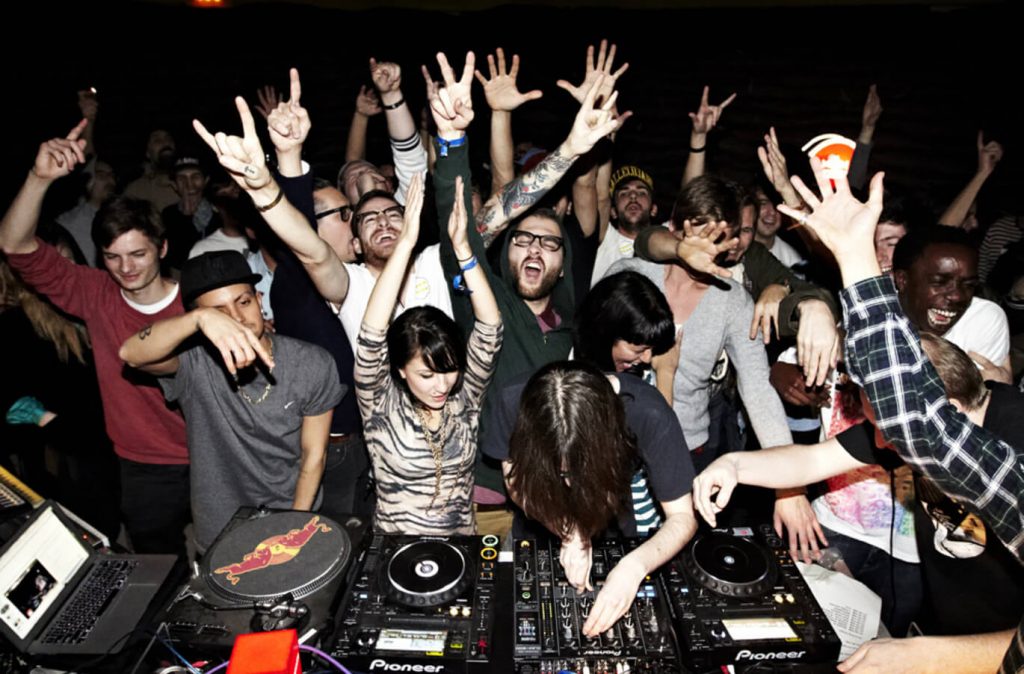By: Shelby Deegan
Boiler room sets have become infamous for jumpstarting small artists careers and creating characters out of the concert-goers who attend, by the millions of viewers who tune in to the sets on YouTube. Big names like Peggy Gou, Fred again…, Chet Faker, and Bonobo, have made appearances. And lest we forget Montreal’s own, Kaytranada’s infamous Boiler Room set, featuring several characters that have been talked about almost as much as the set itself. But what influence does Boiler Room have on the artists and music scene it features?
Boiler Room’s premise is quite simple. They film DJ sets with live audiences and stream them on their YouTube channel, which now has a sizable 3.76M subscribers. By putting the sets online, they make underground club culture, a scene that known for its exclusivity, accessible to literally anyone with a device. Doing so has allowed for small creators who get featured to reach much larger audiences than they could just playing at small clubs. DJ Sherelle was 26 and not really gaining much traction as an artist when she got invited to do a Boiler Room set (Iqbal). After the set, she blew up practically overnight, and now has two agents, her own record label, and a residency on BBC Radio 1 (Iqbal).
However, the seemingly contradictory nature of Boiler Room streaming sets, that were built out of a culture that hinges on its inaccessibility and exclusivity to keep it’s unique allure, begs the question: is the influence of Boiler Room on the industry it is built on entirely positive? The answer is a bit nuanced. In 2016 and 2017, Boiler Room was involved in Notting Hill Carnival, a large street festival in London which highlights Caribbean cultures, to create video content and livestream different sound systems from the festival (Harrison). Their involvement was not received entirely positively though, with some criticisms even being manifested in the form of graffiti at the festival (Harrison). Some of the criticism stemmed from a perception of Boiler Room corporatising the festival (Harrison). Some also came from a feeling of constant live-streaming intruding on peoples privacy, as clear consent was not given by festival attendees to be filmed (Harrison).
However, these issues seem to have been mostly contained to Boiler Room’s involvement in the Notting Hill Carnival, and in the last few years Boiler Room has only grown in prominence. It holds a special place in the heart of many Montrealers, especially after holding two nights of sets this past November. Common club names in the city such as Sam Blake and Lia Plutonic took center stage for the excitement of many fans getting to see some of their local DJs being highlighted at such a big event. Each DJ was at their best for the event, with sets far more intricate, and the audience energy much higher, than at a local Barbossa or Datcha set, which many of them have played at.
Even without hosting a fully Boiler Room-run event in the last several years the company has maintained a presence in Montreal’s club scene by hosting events part of the city’s larger umbrella events such as igloofest and Piknic Electronik. Despite Boiler Room’s ‘corporatisation’ of these events, in the eyes of some, the benefits for attendees and the artists featured seems to have outweighed the cons. Since its early beginnings in 2010 as just a webcam taped to a wall, giving people a glimpse into London’s underground scene (boilerroom.tv), Boiler Room has jumpstarted many careers and contributed to the popularisation of electronica far beyond the underground scene it grew out of. Regardless of what you think of Boiler Room and how it has impacted the underground music scene it seems it is here to stay.
Sources
“About.” Boiler Room, boilerroom.tv/about. Accessed 29 Nov. 2023.
Harrison, Angus. “Why There Was Anti-Boiler Room Graffiti at Carnival.” VICE, 29 Aug. 2017, www.vice.com/en/article/599qdz/why-there-was-anti-boiler-room-graffiti-at-carnival.
Iqbal, Nosheen. “Dance Revolution: Has Boiler Room Changed Club Culture Forever?” The Guardian, Guardian News and Media, 28 Sept. 2019, www.theguardian.com/music/2019/sep/28/electronic-dance-revolution-boiler-room-online-djs.
